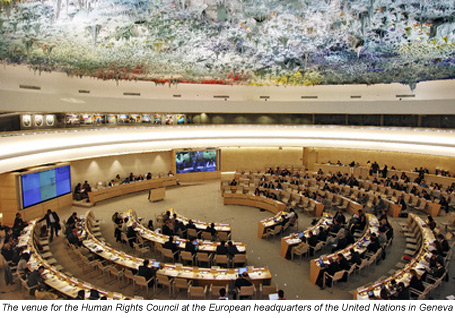On March 7 the Geneva-based UN Human Rights Council held the first-ever formal UN inter-governmental debate on violence and discrimination against LGBT people after a historic resolution seeking equal rights for everyone was passed in June 2011.
A first-of-its-kind UN report released late last year by the UN's high commissioner for human rights, Navi Pillay, identified "a clear pattern of targeted violence and discrimination directed at people because they are, or are perceived to be" lesbian, gay, bisexual. or transgender. The report cited reports of killings, rape, physical attacks, torture, arbitrary detention, the denial of right of assembly, and discrimination in employment, health, and education.
In a video message to council members on March 7, UN Secretary-General Ban Ki-moon conceded that although himself and "many of (his) generation" did not grow up talking about sexual orientation and gender identity issues, he had "learned to speak out because lives are at stake."
He called the imprisonment, torture, and killing of persons based on their sexual orientation "a monumental tragedy for those affected and a stain on our collective conscience." "It is also a violation of international law," he said. "You, as members of the Human Rights Council, must respond."
"To those who are lesbian, gay, bisexual or transgender, let me say: You are not alone. Your struggle for an end to violence and discrimination is a shared struggle. Any attack on you is an attack on the universal values the United Nations and I have sworn to defend and uphold."
According to media reports, Pakistan described homosexuality as "licentious behaviour" while African group leader Senegal said it was not covered by global human rights accords.
"Licentious behaviour promoted under the so-called concept of sexual orientation is against the fundamental teachings of various religions, including Islam," Saeed Sarwar of the Pakistani mission said. "From this perspective, legitimising homosexuality and other personal sexual behaviors in the name of sexual orientation is unacceptable."
Speaking on behalf of the 57-nation Organization of Islamic Cooperation (OIC), Sarwar urged the council not take up the subject of gay rights again.
Later, most but not all Arab and African nations walked out of the debate.
Pakistan's Ambassador to the UN, Zamir Akram wrote on behalf of the government of Pakistan and all the member countries of the OIC of their decision not to participate in the debate. According to media reports, the letter asserted that LGBT rights have "nothing to do with fundamental human rights" and denounced same-sex relationships as "abnormal sexual behaviour;" adding that "the issue of sexual orientation is unacceptable to the OIC." Ambassador Akram's letter concludes by vowing that the OIC member countries "record their opposition to the holding of this panel and will not accept its considerations and recommendations."
Hina Jilani, Chair of the Human Rights Commission of Pakistan and former Special Representative of the Secretary-General on human rights defenders, in a statement however expressed appreciation of the initiative to hold the panel and that it was of utmost importance to discuss the serious issues raised in the High Commissioner's report. She highlighted the Supreme Court of Pakistan's decision around transgendered persons concerning their right to identity, noting that solutions can emerge from countries where violations are still occurring.
For a detailed report of the session, visit www.ohchr.org.

